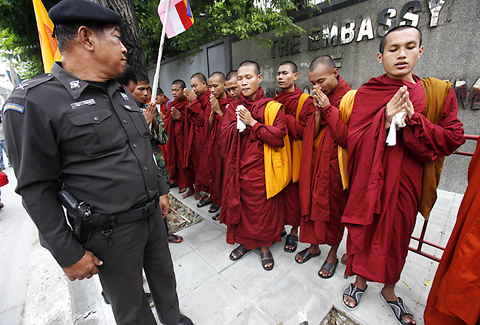Myanmar’s military regime unexpectedly opened pro-democracy leader Aung San Suu Kyi’s trial to reporters yesterday and allowed diplomats to meet her — rare concessions in the face of worldwide outrage over the handling of her case.
The Nobel Peace laureate, who has been in detention without trial for more than 13 of the past 19 years, is accused of violating the terms of her house arrest after an American man stayed at her home without official permission.
The offense is punishable by up to five years’ imprisonment.

PHOTO: REUTERS
She is standing trial with two female members of her party who live with her, and John Yettaw, the American who swam to her lakeside home earlier this month and sneaked in uninvited.
The trial adjourned yesterday after two more police officers testified for the prosecution, including one who interviewed Aung San Suu Kyi after her arrest. He said Aung San Suu Kyi told him that she provided Yettaw with rehydration salts and several meals.
A township police officer also presented 23 items of evidence, including two black cloaks that resembled abaya typically found in Saudi Arabia, which Yettaw allegedly left behind for Aung San Suu Kyi. Two women modeled the all-black garb in the courtroom.
The 63-year-old Aung San Suu Kyi looked healthy as she thanked foreign envoys for coming to the Insein Prison in her first public comments since she was charged last week, a reporter inside the court said.
“Thank you very much for coming and for your support,” she said inside the courtroom at the end of the third day of the trial.
“I can’t meet you one by one, but I hope to meet you all in better days,” she said.
She then went for a meeting with the ambassadors of Thailand, Singapore and Russia at a so-called “guest house” inside the prison.
Aung San Suu Kyi had been scheduled to be freed next Wednesday after six years under house arrest. The charges against her are widely seen as a pretext for her to stay in detention during polls scheduled for next year — the culmination of the junta’s “roadmap to democracy,” which has been criticized as a fig leaf for continued military rule.
The court on Monday rejected a request by Aung San Suu Kyi’s lawyer for an open trial.
But yesterday the Information Ministry ruled that five foreign correspondents and five local reporters could attend the trial’s afternoon session.
Authorities also said all embassies could send one diplomat.
A US consular official had been allowed to attend the court sessions because Yettaw is standing trial, but the proceedings were otherwise closed to the press and public.
The move comes a day after ASEAN expressed “grave concern” about developments related to Aung San Suu Kyi and reaffirmed calls for her immediate release. It also called for her to get adequate medical care and be treated with dignity.
Asked to explain the regime’s apparent change of heart, a Western diplomat said that following international pressure on the ruling generals, particularly by ASEAN, “one has to ask if all these pressures played a role.”

Kehinde Sanni spends his days smoothing out dents and repainting scratched bumpers in a modest autobody shop in Lagos. He has never left Nigeria, yet he speaks glowingly of Burkina Faso military leader Ibrahim Traore. “Nigeria needs someone like Ibrahim Traore of Burkina Faso. He is doing well for his country,” Sanni said. His admiration is shaped by a steady stream of viral videos, memes and social media posts — many misleading or outright false — portraying Traore as a fearless reformer who defied Western powers and reclaimed his country’s dignity. The Burkinabe strongman swept into power following a coup in September 2022

‘FRAGMENTING’: British politics have for a long time been dominated by the Labor Party and the Tories, but polls suggest that Reform now poses a significant challenge Hard-right upstarts Reform UK snatched a parliamentary seat from British Prime Minister Keir Starmer’s Labor Party yesterday in local elections that dealt a blow to the UK’s two establishment parties. Reform, led by anti-immigrant firebrand Nigel Farage, won the by-election in Runcorn and Helsby in northwest England by just six votes, as it picked up gains in other localities, including one mayoralty. The group’s strong showing continues momentum it built up at last year’s general election and appears to confirm a trend that the UK is entering an era of multi-party politics. “For the movement, for the party it’s a very, very big

ENTERTAINMENT: Rio officials have a history of organizing massive concerts on Copacabana Beach, with Madonna’s show drawing about 1.6 million fans last year Lady Gaga on Saturday night gave a free concert in front of 2 million fans who poured onto Copacabana Beach in Rio de Janeiro for the biggest show of her career. “Tonight, we’re making history... Thank you for making history with me,” Lady Gaga told a screaming crowd. The Mother Monster, as she is known, started the show at about 10:10pm local time with her 2011 song Bloody Mary. Cries of joy rose from the tightly packed fans who sang and danced shoulder-to-shoulder on the vast stretch of sand. Concert organizers said 2.1 million people attended the show. Lady Gaga

SUPPORT: The Australian prime minister promised to back Kyiv against Russia’s invasion, saying: ‘That’s my government’s position. It was yesterday. It still is’ Left-leaning Australian Prime Minister Anthony Albanese yesterday basked in his landslide election win, promising a “disciplined, orderly” government to confront cost-of-living pain and tariff turmoil. People clapped as the 62-year-old and his fiancee, Jodie Haydon, who visited his old inner Sydney haunt, Cafe Italia, surrounded by a crowd of jostling photographers and journalists. Albanese’s Labor Party is on course to win at least 83 seats in the 150-member parliament, partial results showed. Opposition leader Peter Dutton’s conservative Liberal-National coalition had just 38 seats, and other parties 12. Another 17 seats were still in doubt. “We will be a disciplined, orderly